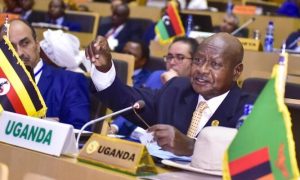By Our Reporter
Lwengo – The contest for the Lwengo Town Council mayoral seat has gained fresh momentum after Bruce N. Tushabe declared his bid for the 2026–2031 term, pledging to lead with integrity, place citizens at the heart of decision-making, and overhaul service delivery systems to meet the real needs of the community.
His entry into the race has stirred political debate in the district, with many residents expressing renewed hope for transparent and accountable local leadership.
His pledge comes at a time when public confidence in local governance especially in Lwengo District has been eroded by allegations of mismanagement, political complacency, and underwhelming service delivery.
Addressing residents in the bustling centre of Lwengo Town, Tushabe drew a sharp line between his vision for leadership and what he described as the entrenched culture of self-enrichment and neglect that has for years left communities without basic services.
He said his campaign was not simply about winning an election but about setting the standard for integrity, accountability, and service beyond personal or political gain.
“The first thing I will do when I take office is to break the back of corruption. We have lost too much to theft, kickbacks, and dubious deals. I will ensure that every shilling collected is put to work for the people, not for individuals in offices,” he told a crowd of traders, farmers, and boda boda riders.
Tushabe outlined a detailed agenda rooted in the statutory responsibilities of a Town Council Mayor, saying he intends to fully enforce and revitalise these duties. These include presiding over council meetings and ensuring that resolutions are implemented promptly, overseeing the drafting and execution of development plans, and supervising the work of technical officers to guarantee that projects are completed on time and to standard.
He promised to keep a firm hand on the council’s budgeting process, to ensure that funds are allocated transparently and in alignment with the priorities identified by residents through consultative forums.
He also spoke of the mayor’s role in spearheading infrastructure development, ranging from maintaining feeder roads to upgrading town drainage systems to prevent flooding.
According to him, a mayor must take responsibility for enforcing urban planning regulations, managing solid waste collection and disposal, and promoting a clean and healthy environment.
Tushabe said he would not hesitate to hold contractors accountable for shoddy work or delays, promising to put in place strict monitoring and evaluation systems.
In addition, he noted that the Town Council is mandated to license businesses, regulate trade, and stimulate local economic growth. He pledged to simplify the licensing process, encourage investment, and remove bureaucratic obstacles that discourage small and medium-sized enterprises from thriving.
“Economic empowerment begins with creating an enabling environment for business,” Tushabe said, adding that he would strengthen market infrastructure and ensure fair levies that do not stifle the livelihoods of ordinary traders.
Public safety and community welfare also featured prominently in his plans. Tushabe said a proactive mayor must work closely with law enforcement and local leaders to reduce crime and resolve community disputes.
He pledged to promote youth sports, cultural activities, and skills development programs as a way of steering young people away from idleness and crime. He promised to prioritise the inclusion of women and youth in council programs, arguing that their participation in governance and economic activity is essential to sustainable development.
On matters of health and education, he said the mayor’s office has a direct role in ensuring that public facilities are well-equipped and efficiently run. He pledged to advocate for better staffing and resources in local schools, as well as to monitor the performance of government health centres to ensure that they meet the community’s needs.
“A leader cannot sit in an office and wait for reports,” he said. “We must be in the field, inspecting, listening, and responding immediately where there are gaps,” he said.
Residents at the rally responded warmly to his message, with several saying his focus on grassroots empowerment resonated with their daily struggles.
“We are tired of leaders who only appear during campaigns and disappear afterwards,” said a shopkeeper from the main market. “What we need is someone who is present, listens to us, and takes action. If Tushabe can do that, then he will have our support.”
Tushabe’s entry into the race is already shifting the political conversation in Lwengo. While some of his rivals have yet to unveil their platforms, his early emphasis on the full scope of a mayor’s duties has drawn praise from civic activists and opinion leaders, who say it sets a higher benchmark for accountability.
Political observers note that his background in community engagement and his willingness to confront corruption directly could make him a formidable contender in the upcoming elections.
As the campaign season draws nearer, Tushabe says he will continue touring the wards of Lwengo Town Council to engage residents directly, hear their concerns, and explain how his administration would work.
He insists that his leadership will be guided by the principle that public office is a public trust, one that must be honoured through visible results and an open door to all citizens.
“The mayor is the people’s chief servant,” he said, “and I intend to serve with honesty, courage, and unwavering commitment to the community that entrusts me with that responsibility.”































